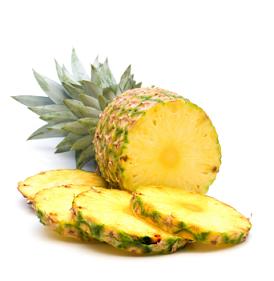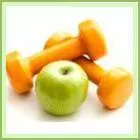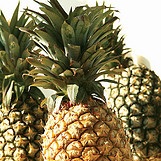Pineapple Nutrition Facts,
Health Benefits of Pineapple
All about pineapple nutrition information, pineapple juice nutrition, nutritional benefits of pineapple and pineapple juice
The pineapple was first discovered as far back as the 14th century and originates from South America. It’s a lovely juicy sweet fruit, with a high sugar content, and can be eaten fresh, out of cans or as a juice.
It has just 48 calories per serving (100g or 3.5oz) with almost no fat and contains no cholesterol, so perfect as a dessert or to quench your thirst. To prepare a pineapple, simply cut off the thick peel, slice and remove the woody core.
The pineapple is packed with vitamin C and manganese, providing 60% and 59% respectively of our recommended daily intake. It also contains modest amounts of other vitamins and minerals. Pineapples contain an enzyme called bromelain, which acts as an anti-inflammatory and along with manganese, aids our digestion. The fruit is also thought to be good for boosting our immune systems. Pineapples are thought to aggravate stomach ulcers, so if you have one, then you may wish to avoid this fruit. Note that the canning process of pineapple will reduce its nutrient levels, so try and eat fresh pineapple.
An unripe pineapple is acidic rather than sweet, so choose carefully. It should be slightly firm and smell nice. Once picked, pineapples will not get any sweeter.
Compare pineapple nutrition facts to the other fruits.

Nutritional Value of Pineapple
| Pineapple nutritional value per 100 g (3.5 oz) Scientific Name: Ananus comosus |
||
|---|---|---|
| Proximates: | ||
| Nutrients | Pineapple, raw, all varieties | Pineapple juice, canned, unsweetened, without added ascorbic acid |
| Water | 86.46 g | 86.37 g |
| Energy | 202 kJ (48 kcal) | 220 kJ (53 kcal) |
| Protein | 0.54 g | 0.36 g |
| Carbohydrates | 12.63 g | 12.87 g |
| Total Fat: | 0.12 g | 0.12 g |
| Fiber | 1.4 g | 0.2 g |
| Cholesterol | 0 mg | 0 mg |
| Minerals: | ||
| Calcium, Ca | 13 mg (1.3 %) | 13 mg (1%) |
| Iron, Fe | 0.28 mg (2 %) | 0.31 mg (2%) |
| Magnesium, Mg | 12 mg (3 %) | 12 mg (3%) |
| Phosphorus, P | 8 mg (1 %) | 8 mg (1%) |
| Potassium, K | 115 mg (2.4 %) | 130 mg (4%) |
| Sodium, Na | 1 mg (0.04 %) | 2 mg (0%) |
| Zinc, Zn | 0.10 mg (0.7 %) | 0.11 mg (1%) |
| Copper, Cu | 0.099 mg (5 %) | 0.069 mg (3%) |
| Manganese, Mn | 1.177 mg (59 %) | 0.504 mg (25%) |
| Selenium, Se | 0.1 mcg (0.1 %) | 0.1 mcg (0%) |
| Vitamins: | ||
| Vitamin C | 36.2 mg (60 %) | 10 mg (17%) |
| Thiamine (Vit. B1) | 0.079 mg (5.3 %) | 0.058 mg (4%) |
| Riboflavin (Vit. B2) | 0.031 mg (2 %) | 0.021 mg (1%) |
| Niacin (Vit. B3) | 0.489 mg (2.4 %) | 0.199 mg (1%) |
| Pantothenic acid (B5) | 0.205 mg (2 %) | 0.056 mg (1%) |
| Vitamin B6 | 0.110 mg (6 %) | 0.1 mg (5%) |
| Folate (Vit. B9) | 15 mcg (4 %) | 18 mcg (5%) |
| Vitamin A | 56 IU (1 %) | 5 IU (0%) |
| Vitamin E | 0.02 mg (0.1 %) | 0.02 mg (0.1%) |
| Vitamin K | 0.7 mcg (0.9 %) | 0.3 mcg (0%) |
| Percentages are relative to US Recommended Daily Intake (RDI) for adults. | ||
Author: Lana Soko
You Might Also Like:
Like This Page?
|
Share This Page:
|
Search Our Site:

Free E-Book:
We Recommend:
Looking to get your body into great shape? Get the very best results for your efforts and money! Save your valuable time from surfing the internet. These are theBestselling Weight Loss Programs

Programs that work and have thousands of satisfied customers worldwide!

 |




